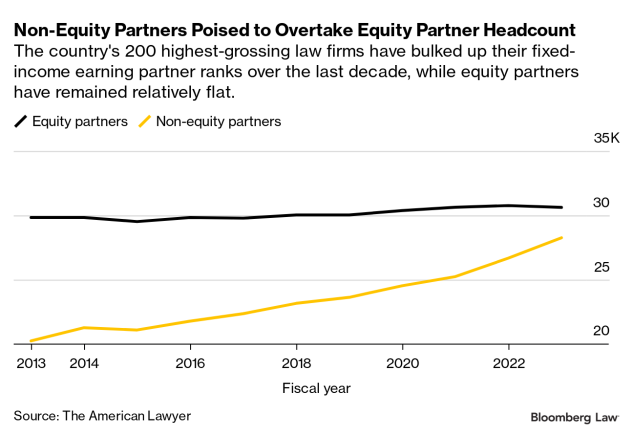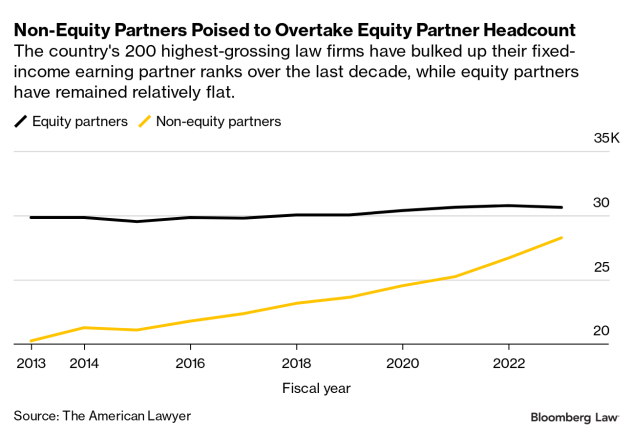Unequal Partnership Cases Test the Great Employment Model of the Law
Other problems are emerging as a result of the legal industry accepting unfair deals, as two lawyers sued the firms this year over their position on the case.
Attorneys suing Duane Morris and Thompson Hine claim they were underpaid and discriminated against. The inequality gap was a “meaningless title almost like an albatross,” the defendant’s lawyer says. A former equity partner paid only the salary brought a similar suit against Lewis Brisbois Bisgaard & Smith.
Law firms are fighting suits. “We strongly disagree with the allegations made in the complaint,” Duane Morris said in a statement. “We look forward to responding to those allegations and vigorously defending the case in court.”
What is not clear is whether the lawyers will prevail, sending obstacles through the General Law and reducing the use of the enhanced status of the firms. On the other hand, a firm win for law firms can boost firms’ confidence in the division.
The cases so far point to the need for firms to clearly explain the benefits and burdens of separation to increasing partners, said Peter Glennon, a New York labor lawyer. He said: “It is no longer a one-size-fits-all union. “These cases are few, but more will come.”
Legal firms have increased their use of non-equity roles to retain talent and increase profits for the top. Attorneys in this group earn title and bill hours at higher rates than their colleagues while commanding the larger payouts that typically accompany partnership positions.
About 48% of the nearly 59,000 partners at the 200 largest law firms last year were in unequal positions, up from 40% in 2013, according to Lawyer’s data America. At the same time, the average profit for each partner grew by 90% to $2.24 million.
Firms “want to attract and retain people who might not be a good fit for an equity partnership,” said Nick Rumin, a New York law firm. “Firms need to maintain equity for efficient partners and attract partners. The more money there is, the more competitive the firm is.”
Thompson Hine
Rebecca Brazzano, a former partner in law enforcement at Thompson Hine, sued the firm in February in the Southern District of New York. In his suit he describes the role as an “albatross” because he says he could not contribute to the firm’s profits or influence hiring or strategy.
In his suit he said he should be able to bring discrimination charges under Title VII of the Civil Rights Act of 1964. The court’s decision that Brazzano was an employee and not a partner would “reverse the Constitution.” and more to give a voice to workers silenced by predatory defendants under the pretense that such protections are not available,” Brazzano said.
In a letter to the Equal Employment Opportunity Commission in February responding to his allegations, Thompson Hine said that as a partner, Brazzano is not protected by Title VII. The firm said in a statement that it does not publicly discuss its confidentiality agreement.
Duane Morris
In a previous lawsuit, last month’s class action lawsuit against Duane Morris, Meagan Garland said that unequal partners were wrongly divided to “make more profits and reduce business expenses and tax rates.” for its equity partners by illegally transferring those burdens” to lower levels. As a result, Garland says his working pay has decreased since he was promoted.
The firm shifted business expenses and state and local tax responsibilities to non-equity partners, declined 18% of fixed fee compensation to cover expenses and repatriated 4% of its compensation. a year as a capital contribution, the complaint says. . Duane Morris stopped withholding employment taxes from his compensation and began assessing his share of the federal income tax liability, reporting his compensation on IRS Form K-1, the tax form for partners, in has a W-2, it says so.
The firm financed its political action committee “illegally” with funds deducted from the compensation of non-equity partners, supporting political contributions “made with a clear objective in mind,” Garland said. he says. He is still employed by the firm as a finance partner.
Lewis Brisbois
In a lawsuit filed against Lewis Brisbois in April, Julie O’Dell claims that when she was promoted to equity partner she was told she would receive a fixed monthly payment for three years before she could receive a dividend.
O’Dell, who left Lewis Brisbois in January 2023 to work for Armstrong Teasdale, said the firm failed to tell him that “not all equity partners” were considered true owners. Additionally, “all equity partners” were not treated equally for compensation purposes, according to the suit.
Lewis Brisbois said in response to O’Dell’s lawsuit, “As is the case with every equity partner in Lewis Brisbois, Ms. O’Dell was clearly informed of her rights and responsibilities in that role, together with the comfort of every faithful companion.”
#Unequal #Partnership #Cases #Test #Great #Employment #Model #Law

